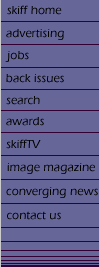 |
Thursday,
April 8, 2004 |
|
|
|
|
 |
 |
Rice’s
testimony will affect election politics, profs say
National
Security Adviser Condoleezza Rice will testify publicly
and under oath today before the commission investigating
Sept.11.
By Sarah
Greene
Staff Reporter
The fact that the commission investigating the attacks
of Sept. 11, 2001, is hearing testimonies about the government’s
actions leading up to attacks during an election year
mean it will impact the election, political science professors
say.
James Riddlesperger, who chairs the political science
departme nt, said President George W. Bush backed down
primarily due to the election.
“The simple truth is that Bush is taking a real PR
hit on the issue and it is distracting from his campaigning,”
Riddlesperger said.
Ralph Carter, a political science professor, said the
upcoming election would have an impact on the commission.
“Election year politics to some extent affect everything,”
Carter said.
Initially, the White House would not allow Rice to testify,
saying it would violate executive privilege, or the right
of the president to order a government witness not to
testify before Congress, according to the C-Span Congressional
Glossary.
Bush agreed to reverse his claim of executive privilege
and allow Rice to testify because the Sept. 11 attacks
were a unique circumstance, according to a CNN interview.
“The terrorist threat being examined by the commission
is still present, still urgent and still demands our full
attention,” Bush said.
Political science professor Adam Schiffer said Bush’s
decision to allow a security adviser to testify is rare,
but necessary.
“It’s highly unusual for an adviser to testify,
but it’s also highly unusual for terrorists to blow
up a building in America,” Schiffer said.
Carter said it was politically imperative that Bush make
this decision, because he was getting pressure from both
Republicans and Democrats.
In the past, presidents have claimed executive privilege
and have sounded self-serving, Riddlesperger said. In
the instances of Richard Nixon with Watergate and Bill
Clinton with Monica Lewinsky, both presidents hid behind
the claim. Therefore, when Bush used executive privilege
to keep Rice from testifying, he looked bad, Riddlesperger
said.
Rice will face questions based on accusations former White
House counterterrorism chief, Richard Clarke, made against
the Bush administration in his recent testimony to the
commission.
Clarke, who served under Clinton and Bush, testified the
Bush administration did not put enough focus on the threat
of terrorism prior to Sept. 11 and that they used the
attacks as a pretense for invading Iraq, according to
a CNN report.
“Your government failed you,” Clarke said. “Those
entrusted with protecting you failed you, and I failed
you.”
Rice’s testimony will be interesting because there
has been an all-out effort by the Bush administration
to destroy Clarke’s credibility, but so far Clarke
has been able to back up his claims with documents, Schiffer
said.
Riddlesperger said Rice will give a strong rebuttal against
Clarke, and predicts that the commission will scrutinize
the day-by-day manner in which the Bush administration
handled terrorism.
“I think that she will say that the Bush administra
tion took terrorism seriously, that they were not asleep
at the wheel,” Carter said.
|
|
|
|
|
|
|